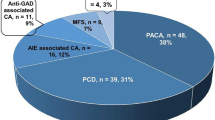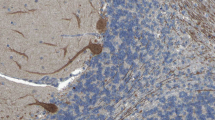Abstract
Cerebellar adult onset ataxia is a heterogeneous condition. The aim of this study was to ascertain if there is a heightened autoimmune background in patients with sporadic cerebellar ataxia of unknown origin, and if autoimmunity correlates with a more rapid evolution of the ataxia. We selected patients with sporadic progressive adult onset cerebellar ataxia with a follow-up of >5 years. As controls we included 43 patients with genetically demonstrated hereditary ataxia. All patients were tested for a panel of neuronal (onconeuronal, glutamate-decarboxylase [GAD], IgG/IgA transglutaminase 6 antibodies) and systemic non-neuronal antibodies (including IgG/IgA gliadin and transglutaminase 2, thyroperoxidase, thyroglobulin, antinuclear, striational, smooth muscle, mitochondrial, liver kidney microsomal, and parietal gastric cells antibodies). Correlation between the antibodies and disease progression was studied with Cox regression models and Kaplan–Meier plots. Forty-four patients were included. All patients were negative for onconeuronal or GAD antibodies. There were no significant differences between patients and controls in the prevalence of transglutaminase 6, 2, gliadin, or thyroid antibodies. However, when we studied the panel of systemic non-neuronal autoantibodies as a group, antibodies were more frequent in patients with sporadic ataxia (p = 0.018). The presence of one or more systemic non-neuronal antibodies correlated with a faster evolution to stage 2 (loss of independent gait) (p = 0.03) and shorter survival (p = 0.03) in patients with sporadic ataxia. We conclude that there is probably a heightened autoimmune background in some patients with sporadic cerebellar ataxia of unknown origin. The presence of systemic non-neuronal autoantibodies is a prognostic marker.

Similar content being viewed by others
References
Klockgether T (2010) Sporadic ataxia with adult onset: classification and diagnostic criteria. Lancet Neurol 9:94–104
Bürk K, Wick M, Roth G et al (2010) Antineuronal antibodies in sporadic late-onset cerebellar ataxia. J Neurol 257:59–62
Hadjivassiliou M, Grünewald R, Sharrack B et al (2003) Gluten ataxia in perspective: epidemiology, genetic susceptibility and clinical characteristics. Brain 126:685–691
Abele M, Schöls L, Schwartz S, Klockgether T (2003) Prevalence of antigliadin antibodies in ataxia patients. Neurology 60:1674–1675
Klockgether T, Lüdtke R, Kramer B et al (1998) The natural history of degenerative ataxia: a retrospective study in 466 patients. Brain 121:589–600
Rubio-Agusti I, Perez-Miralles F, Sevilla T et al (2011) Peripheral nerve hyperexcitability: a clinical and immunological study of 38 patients. Neurology 76:172–178
Bataller L, Valero C, Diaz R et al (2009) Cerebellar ataxia associated with neuroendocrine thymic carcinoma and GAD antibodies. J Neurol Neurosurg Psychiatry 80:696–697
Zuliani L, Sabater L, Saiz L et al (2007) Homer 3 autoimmunity in subacute idiopathic cerebellar ataxia. Neurology 68:239–240
Abele M, Bürk K, Schöls L et al (2002) The aetiology of sporadic adult-onset ataxia. Brain 125:961–968
Ramos-Casals M, García-Carrasco M, Brito MP et al (2003) Autoimmunity and geriatrics: clinical significance of autoimmune manifestations in the elderly. Lupus 12:341–355
Selim M, Drachman DA (2001) Ataxia associated with Hashimoto’s disease: progressive non-familial adult onset cerebellar degeneration with autoimmune thyroiditis. J Neurol Neurosurg Psychiatry 71:81–87
Hadjivassiliou M, Aeschlimann P, Striqun A et al (2008) Autoantibodies in gluten ataxia recognize a novel transglutaminase. Ann Neurol 64:332–343
Violante V, Luongo A, Pepe I et al (2001) Transglutaminase dependent formation of protein aggregates as possible biochemical mechanism for polyglutamine diseases. Brain Res Bull 56:169–172
Acknowledgment
The authors thank Emilia Cabañero for excellent technical assistance, and Francesc Graus, Hospital Clinic, Barcelona, Spain for confirmation of positive onconeuronal antibody tests. Grant PS09/01350, Fondo de Investigación Sanitaria, Instituto de Salud Carlos III, Madrid, Spain.
Conflict of interest
The authors declare that they have no conflict of interest.
Author information
Authors and Affiliations
Corresponding author
Electronic supplementary material
Below is the link to the electronic supplementary material.
Rights and permissions
About this article
Cite this article
Sivera, R., Martín, N., Boscá, I. et al. Autoimmunity as a prognostic factor in sporadic adult onset cerebellar ataxia. J Neurol 259, 851–854 (2012). https://doi.org/10.1007/s00415-011-6266-8
Received:
Revised:
Accepted:
Published:
Issue Date:
DOI: https://doi.org/10.1007/s00415-011-6266-8




